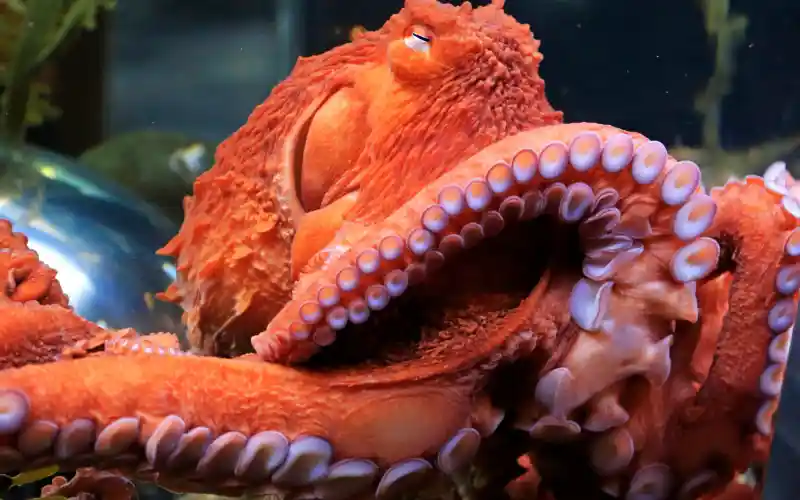Connect with us
Published
11 months agoon

Anyone who has taken MDMA probably experienced a euphoric burst of touchy-feeliness. Turns out that octopuses do, too.
A 2018 study from researchers at Johns Hopkins University, the findings of which were highlighted in a story this month in Psychedelic Spotlight, tested the “behavioral reaction to the popular mood-altering drug MDMA, or ecstasy” on the otherworldly sea creatures. The experiment turned the animals’ habitat into something resembling an underwater rave.
Here’s how it worked: the lead researcher “designed an experiment with three connected water chambers: one empty, one with a plastic action figure under a cage, and one with a female or male laboratory-bred octopus under a cage.”
“Four male and female octopuses were exposed to MDMA by putting them into a beaker containing a liquefied version of the drug, which is absorbed by the octopuses through their gills. Then, they were placed in the experimental chambers for 30 minutes. All four tended to spend more time in the chamber where a male octopus was caged than the other two chambers,” the write-up from Johns Hopkins explained.
More from the write-up:
“Most octopuses are asocial animals and avoid others, including other octopuses. But because of some of their behaviors, Dölen still thought there may be a link between the genetics that guide social behavior in them and humans. One place to look was in the genomics that guide neurotransmitters, the signals that neurons pass between each other to communicate. Gül Dölen and Eric Edsinger, a research fellow at the Marine Biological Laboratory in Woods Hole, Massachusetts, took a closer look at the genomic sequence of Octopus bimaculoides, commonly referred to as the California two-spot octopus. Specifically, in the gene regions that control how neurons hook neurotransmitters to their membrane, Dölen and Edsinger found that octopuses and humans had nearly identical genomic codes for the transporter that binds the neurotransmitter serotonin to the neuron’s membrane. Serotonin is a well-known regulator of mood and closely linked to certain kinds of depression.”
Dölen, assistant professor of neuroscience at the Johns Hopkins University School of Medicine and the lead investigator conducting the experiments, explained that the “brains of octopuses are more similar to those of snails than humans, but our studies add to evidence that they can exhibit some of the same behaviors that we can.”
“What our studies suggest is that certain brain chemicals, or neurotransmitters, that send signals between neurons required for these social behaviors are evolutionarily conserved,” said Dölen.
Dölen said that the extensive period the octopuses spent in the experimental chambers was “not just quantitatively more time, but qualitative.”
“They tended to hug the cage and put their mouth parts on the cage,” Dölen said. “This is very similar to how humans react to MDMA; they touch each other frequently.”
“Octopuses will suspend their antisocial behavior for mating, for example. Then, when they are done mating, they go into aggressive, asocial mode,” added Dölen.
Dölen noted that “the experiments suggest that the brain circuits guiding social behavior in octopuses are present in normal conditions, but may be suppressed by natural or other circumstances.”
Octopuses have long been a source of fascination among marine biologists for their prodigious intelligence and advanced behavior.
As Psychedelic Spotlight put it, how “little science still knows about octopuses is startling.” The website highlighted a 2018 peer-reviewed study that actually questioned whether the animals are aliens.
“It’s then not surprising that scientists wanted to know more about the consciousness of octopuses and how they react to mood-altering substances like MDMA (3,4-Methyl?enedioxy?methamphetamine),” the website said. “Known for its ability to increase feelings of happiness and closeness, MDMA ups serotonin production, a neurotransmitter in the brain linked to these feelings. Octopus brains are similar to human brains here.”


Cresco Labs Workers Reportedly De-Unionize


Arizona Church Reaches Settlement with DEA To Allow Sacramental Use of Ayahuasca


Gov. Kathy Hochul Honors New York’s 100th Adult-Use Retail Store Opening


D.A.R.E. Officer of the Year Discusses Relative Using Medical Cannabis for Cancer


Sweden Authorities Seize 1.4 Tons of Cocaine, ‘One of the Biggest’ Seizures Ever


Uber Eats Shares ‘Dopest’ Cities With Most MJ Deliveries in British Columbia, Ontario
